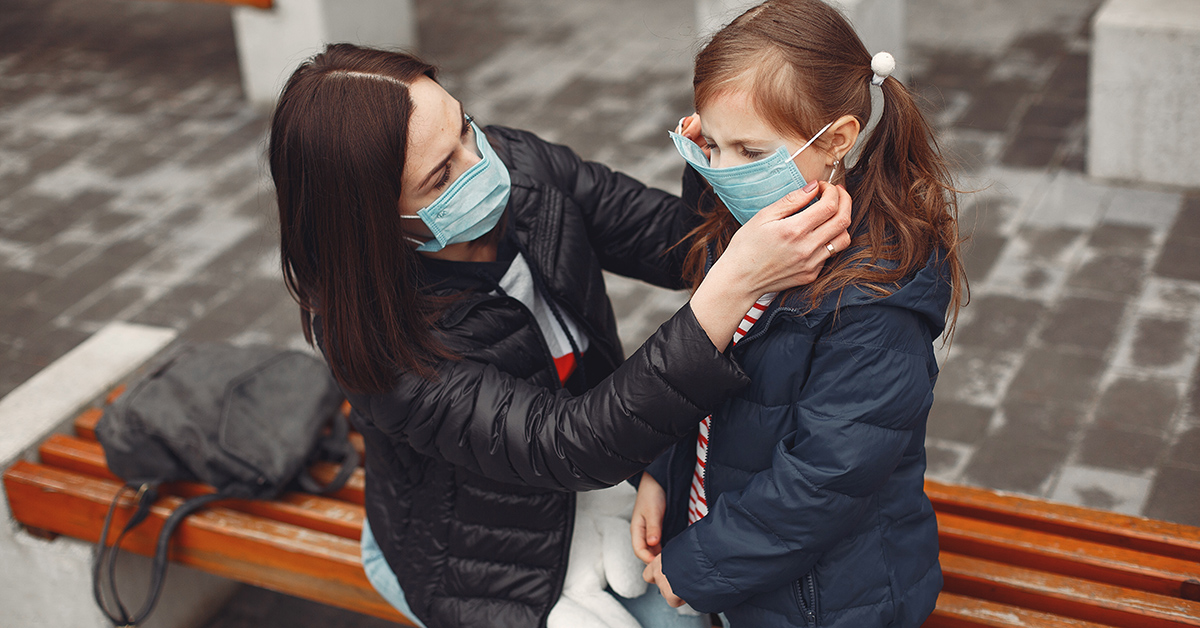Keeping Children Safe During COVID-19 and Beyond
A pediatric pharmacist weighs in on precautions and actions to take to keep kids healthy during the pandemic and into flu season.

Pediatric pharmacists are taking the same precautions they would take for adult patients. These include wearing masks and/or eye shields, washing hands often and using social distancing.
Since the COVID-19 pandemic began, we’ve been highlighting the numerous ways that healthcare workers are stepping up to do their part in meeting this crisis. The physical and mental health of the communities they serve continues to be the priority as scientists continue to learn more about the virus and officials proceed with best practices for safely opening up businesses and institutions.
As more and more states open up, headlines are revealing an uptick in COVID-19 cases among younger ages. We spoke with Chephra McKee, Pharm.D., about her role as a Pediatric Pharmacist facing COVID-19, how she specializes her work for younger patients and what ramifications the pandemic will have in the future. McKee is an Assistant Professor of Pharmacy Practice in the Pediatrics Division at TTUHSC Jerry H. Hodge School of Pharmacy at the Abilene campus.
Pediatric Precautions During COVID-19
Pediatric pharmacists are taking the same precautions they would take for adult patients, McKee said. These include wearing masks and/or eye shields, washing hands often and using social distancing.
“Just because [young people] haven’t been getting it as much or as severely doesn’t mean we don’t want to take the same precautions,” McKee explained.
Advice for Parents and Care Providers During COVID-19

Chephra McKee, Pharm.D.
It’s perfectly natural and understandable that parents and those caring for children during the pandemic are worried. McKee recommends being familiar with symptoms of COVID-19 and calling your pediatrician when that “Mommy or Daddy gut feeling” kicks in. A list of COVID-19 symptoms is consistently updated on the CDC website.
Children’s mental health is also an important factor to keep an eye on. Talking to your kids about COVID-19 is vital, but it’s important to be honest and not give information that’s too overwhelming.
“A lot of them haven’t seen their friends since this started,” McKee said. “They tend to miss their friends and they may not know how to express that emotion because they are not to that point.”
Having discussions with your kids about what’s going on is important while giving them information that they can act on and use in a positive way.
Flu Shots Will be Crucial During COVID-19 and Flu Season
The COVID-19 pandemic has renewed the controversial debate of vaccinations and immunizations.
“We know they are safe,” McKee said. “We know they are effective at preventing diseases.”
She believes it’s very important for those in healthcare to listen to families’ concerns about why they would be hesitant to be vaccinated. They may have heard something from a friend or even from a news source that could be false.
McKee emphasizes that it will be very important for children to get a flu shot this year, considering the chances for additional COVID-19 waves.
Penn Medicine best explains why the flu shot is critical in 2020:
“Getting the flu vaccine every year is the best way to prevent infection with influenza, a virus that can cause many of the same symptoms as COVID-19, including fever, cough, difficulty breathing and even death. Flu vaccines are usually available in the fall each year. Particularly during the COVID-19 pandemic, it’s even more important to be vaccinated against the flu to help prevent influenza, avoid a mistaken diagnosis of COVID-19 and preserve healthcare resources. There is no evidence that getting a flu vaccine increases the risk of getting COVID-19.”
Conclusion
The most important thing is to ask healthcare questions and discuss your concerns with your doctor and pharmacist. The pandemic has shown us that we’re connected beings, for better or worse. Our actions matter. Our choices matter. McKee and so many other healthcare workers are risking their health so children can maintain theirs.
Related Stories
Celebrating Veterans: TTUHSC’s General Martin Clay’s Legacy of Service and Leadership
From his initial enlistment in the Army National Guard 36 years ago to his leadership in military and civilian health care management roles, Major General Martin Clay’s career has been shaped by adaptability, mission focus and service to others.
Texas Tech University Health Sciences Center School of Nursing Named Best Accelerated Bachelor of Science in Nursing Program in Texas
The TTUHSC School of Nursing Accelerated Bachelor of Science in Nursing (BSN) program has been ranked the No. 1 accelerated nursing program in Texas by RegisteredNursing.org.
TTUHSC Names New Regional Dean for the School of Nursing
Louise Rice, DNP, RN, has been named regional dean of the TTUHSC School of Nursing on the Amarillo campus.
Recent Stories
National Academy of Inventors Names TTUHSC Faculty Senior Members
The National Academy of Inventors (NAI) has designated two current and one former TTUHSC faculty researchers as Senior Members.
The John Wayne Cancer Foundation Surgical Oncology Fellowship Program at Texas Tech University Health Sciences Center Announced
TTUHSC is collaborating with the John Wayne Cancer Foundation and has established the Big Cure Endowment, which supports the university’s efforts to reduce cancer incidence and increase survivability of people in rural and underserved areas.
TTUHSC Receives $1 Million Gift from Amarillo National Bank to Expand and Enhance Pediatric Care in the Panhandle
TTUHSC School of Medicine leaders accepted a $1 million philanthropic gift from Amarillo National Bank on Tuesday (Feb. 10), marking a transformational investment in pediatric care for the Texas Panhandle.
